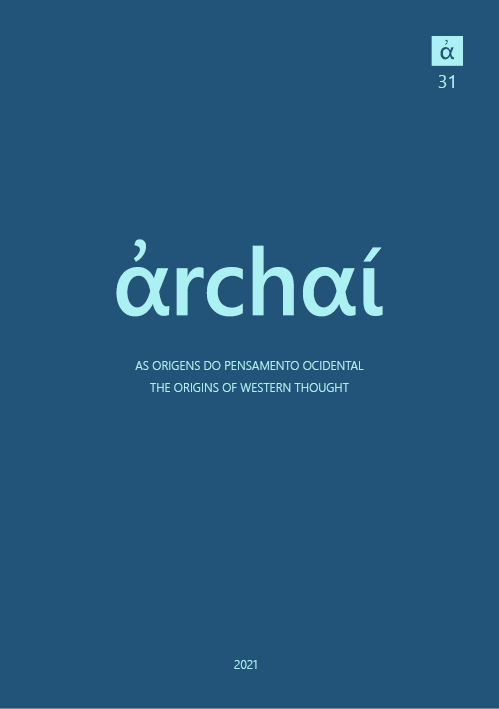Measurement and excess in Ajax: transition from an agonal ethic to an enlightened ethic.
DOI:
https://doi.org/10.14195/1984-249X_31_1Palavras-chave:
measure, excess, enlightened ethics, agonal ethicResumo
In Sophocles’ Ajax, a recurring conflict between two axiological systems gets thematized: the archaic, in which agonal values and personal excellence predominate, and the enlightened, which corresponds to the demands of already-developed cities (poleis) and their values of equality and communal deliberation. This conflict is developed from a topic typical of the practical ideology of the time: the problem of measure and excess (metron/hybris). The present work will account for the peculiar Sophoclean treatment of this problem through the analysis of the lexicon in different passages of the work. As will be seen, characters as antagonistic as Ajax, Menelaus, and Agamemnon nonetheless concord in word choice when substantiating their decisions regarding how to act in situations of conflict. These words define common concepts typical of the archaic heroic code. On the contrary, other characters such as Tecmesa, the sailors’ choir, Odysseus himself, and Athena take different perspectives that are linked to enlightened demands.
Downloads
Referências
ADAMS, S. M. (1955). The Ajax of Sophocles. En Phoenix 9, p. 93-110.
ADKINS, A. W. H. (1965). Merit and Responsibility. A Study in Greek Values. Oxford: Oxford University Press.
ALAMILLO A. (2008). Sófocles. Tragedias (Introducción, traducción y notas). Madrid: Gredos.
BIGGS, P. (1966). The Disease Theme in Sophocles’ Ajax, Philoctetes, and Trachiniae. En Classical Philology 61, p. 223-235.
BROWN, E. (1965). Sophocles’ Ajax and Homer’s Hector. En The Classical Journal 61, 3, 118-121.
BOWRA, C. M. (1952). Sophoclean Tragedy. Oxford: Oxford Universiy Press.
BOWRA, C. M. (1971). Periclean Athens. Londres, Wiedenfeld and Nicolson.
CALONGUE RUIZ, J., LLEDÓ ÃÑIGO, E., GARCÃA GUAL, C. (1985). Platón. Diálogos I (Introducción, traducción y notas). Madrid: Gredos.
COHEN, D. (1978). The Imagery of Sophocles: a Study of Ajax’s Suicide. En Greece & Rome 25, 1, p. 24-36.
CRESPO GUEMES, E. (1996). Homero. Ilíada (Introducción, traducción y notas). Madrid: Gredos.
CHANTRAINE, P. (1999). Dictionnaire étymologique de la langue grecque. Histoire des mots. París: Kilcksieck.
DIELS, H., KRANZ, W. (eds.) (1966). Die fragmente der Vorsokratiker. Dublin/Zurich: Wiedmann, Bde. 2.
EASTERLING, P. E., KNOX, B. M. W. (eds.) (1990). Historia de la literatura clásica. I Literatura griega. Madrid: Gredos.
EASTERLING, P. E. (ed.) (1997). The Cambridge companion to Greek Tragedy. Cambridge: Cambridge University Press.
EGGERS LAN, C. (1988). Platón. Diálogos IV (Introducción, traducción y notas). Madrid: Gredos.
EVANS, J. A. S. (1991). A Reading of Sophocles’ “Ajax”. En Quaderni Urbinati di Cultura Classica 38, 2, p. -85.
FISHER, N. R. E. (1992). Hybris. A Study in the Values of honour and Shame in Ancient Greece. Warminster: Aris & Phillips.
GASTI, H. (1992). Sophocles’ “Ajax”: The Military “Hybris”. En Quaderni Urbinati di Cultura Classica 40, 1, 81-93.
GUTHRIE, W. (1947). Odysseus in the ‘Ajax’. En Greece & Rome 16, 48, p. 115-119
KIRKWOOD, G. M. (1958). A study of Sophoclean Drama. Ithaca: Cornell University Press.
KNOX, B. M. W. (1961). The Ajax of Sophocles. En Harvard Studies in Classical Philology 65, p. 1-37.
KNOX, B. M. W. (1983). The heroic temper. Studies in sophoclean tragedy. Berkeley: University of California Press.
LAWRENCE, S. (2005). Ancient Ethics, the Heroic Code, and the Morality of Sophocles’ Ajax. En Greece & Rome 52, 1, p. 18-33.
LESKY, A. (1966). La tragedia griega. Barcelona: Editorial Labor.
LLOYD-JONES, H., WILSON, N. G. (eds.) (1990). Sófocles. Sophoclis fabulae. Oxford: Oxford University Press.
MELERO BELLIDO, A. (1996). Sofistas. Testimonios y fragmentos. Madrid: Gredos.
ORSI, R. (2007). El saber del error. Filosofía y tragedia en Sófocles. Madrid-México: Plaza y Valdés Editores-CSIC.
PALLÃ BONET, J. (1985). Aristóteles. Ética nicomaquea. Ética Eudemia (Traducción y notas). Madrid: Gredos.
REINHARDT, K. (2010). Sófocles. Madrid: Gredos.
RODRÃGUEZ ADRADOS, F. (1966). Ilustración y política en la Grecia clásica. Madrid: Revista de occidente.
RODRÃGUEZ ADRADOS, F. (1997). Democracia y literatura en la Atenas clásica. Madrid: Alianza editorial.
SEGAL, CH. (1981). Tragedy and Civilization. An Interpretation of Sophocles. Massachusetts: Harvard University Press.
SEGAL, CH. (1995). Sophocles’ Tragic World: Divinity, Nature, Society. Massachusetts: Harvard University Press.
SINNOTT, E. (2007). Aristóteles. Ética nicomáquea (Introducción, traducción y notas). Buenos Aires: Coligue.
SORUM, C. E. (1985). Sophocles’ Ajax in context. En The Classical World 69, 6, p. 361-377.
WHITMAN, C. H. (1982). The Heroic Paradox. Essays on Homer, Sophocles, and Aristophanes. Londres: Cornell University Press.
ZANKER, G. (1992). Sophocles’ Ajax and the Heroic Values of the Iliad. En The Classical Quarterly 42, 1, p. 20-25.
Downloads
Publicado
Como Citar
Edição
Seção
Licença
Copyright (c) 2021 Esteban Singh Caro

Este trabalho está licenciado sob uma licença Creative Commons Attribution 4.0 International License.
Dado o acesso público desta revista, os textos são de uso gratuito, com obrigatoriedade de reconhecimento da autoria original e da publicação inicial nesta revista. O conteúdo das publicações é de total e exclusiva responsabilidade dos autores.
1. Os autores autorizam a publicação do artigo na revista.
2. Os autores garantem que a contribuição é original, responsabilizando-se inteiramente por seu conteúdo em caso de eventual impugnação por parte de terceiros.
3. Os autores garantem que a contribuição que não está em processo de avaliação em outras revistas.
4. Os autores mantêm os direitos autorais e concedem à revista o direito de primeira publicação, sendo o trabalho licenciado sob a Creative Commons Attribution License-BY.
5. Os autores têm permissão e são estimulados a publicar e distribuir seu trabalho on-line após a publicação na revista.
6. Os autores dos trabalhos aprovados autorizam a revista a, após a publicação, ceder seu conteúdo para reprodução em indexadores de conteúdo, bibliotecas virtuais e similares.
7. É reservado aos editores o direito de proceder ajustes textuais e de adequação do artigo às normas da publicação.



